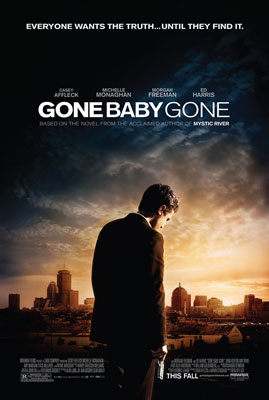 Gone Baby Gone puts the film critic at a disadvantage. For most of its 114-minute runtime, it’s content to be an above average detective yarn distinguished by some deep Beantown atmosphere and an impressive array of carefully modulated performances from old pros (Ed Harris, Morgan Freeman and the underrated John Ashton) and actors on the verge (Casey Affleck, Michelle Monaghan and Amy Ryan). Based on a middle entry from author Dennis Lehane’s well-regarded Kenzie-Gennaro series, the narrative is engaging and clever enough to keep the viewer from leaping ahead to the late third-act twist. And it’s then that the film’s sedulously understated central dilemma suddenly ignites, turning what was just a damn good movie into a potentially great one.
Gone Baby Gone puts the film critic at a disadvantage. For most of its 114-minute runtime, it’s content to be an above average detective yarn distinguished by some deep Beantown atmosphere and an impressive array of carefully modulated performances from old pros (Ed Harris, Morgan Freeman and the underrated John Ashton) and actors on the verge (Casey Affleck, Michelle Monaghan and Amy Ryan). Based on a middle entry from author Dennis Lehane’s well-regarded Kenzie-Gennaro series, the narrative is engaging and clever enough to keep the viewer from leaping ahead to the late third-act twist. And it’s then that the film’s sedulously understated central dilemma suddenly ignites, turning what was just a damn good movie into a potentially great one.
But there’s no discussing it here. In fact, the mere acknowledgment that there is such a moment is precarious; movies like Gone Baby Gone need the leverage. They need to be underestimated. Even if one has seen glimmers of intellect and emotional acuity in his acting, no one walks into Ben Affleck’s directorial debut expecting to walk out devastated (if anything, many probably expect to walk out well before the roll of the closing credits). Years of tabloid-covered romantic misadventure and dicey career moves have turned the once promising actor into a pop culture punch line, the nadir or apogee being that evil South Park episode in which Affleck leaves Jennifer Lopez to fuck Cartman’s Senor Wences caricature of the Latina pop star/actress. How could this guy ever be genuine again?
This question is answered early in Gone Baby Gone, as Affleck, aided by master cinematographer John Toll, confidently thrusts the viewer into the dingy milieu of Dorchester, one of Boston’s roughest neighborhoods and the well-trod stomping grounds of private detective Patrick Kenzie. As played by Ben’s baby-faced brother Casey, Kenzie does not come on as a badass, world-weary gumshoe in the mold of take-your-pick; rather, he’s a taciturn old soul who makes up for what he lacks in physical intimidation with a fiercely adhered-to moral code. His sole idiosyncrasy is giving a shit, and, in the world of this film, it’s clearly this characteristic that brought him into partnership with the equally compassionate Angie Gennaro (Monaghan).
Most detective films would get sidetracked by the are they/aren’t they romantic tension that can’t help but exist between these two disconcertingly attractive leads, but Affleck, for the most part, doesn’t give in. He can’t. There’s too much narrative to contend with. From the beginning, Kenzie and Genarro are up against it: they’ve been hired by the sketchy Beatrice McCready (Amy Madigan) to track down her even sketchier sister’s missing kid. It’s a lose-lose proposition. The mother, Heather McCready (played to the loathsome hilt by Amy Ryan), is a junkie and a party chick; in many ways, losing the kid is the best thing that ever happened to her. Meanwhile, the local police are less than thrilled with Beatrice procuring the services of private investigators; they tend to take such no-confidence gestures personally, especially when the case has turned into a media circus like this one.
But after an icy introduction from police chief Jack Doyle (Freeman, in a refreshingly dialed-in performance), Kenzie and Gennaro slowly gain the respect of the two lead detectives on the case, Remy Bressant (Harris) and Nick Poole (Ashton), who seem to realize Kenzie has a better shot at making inroads in the community than they do. Still, Kenzie’s native son status doesn’t grant him immediate access; there’s still lots of posturing and roughhousing and the occasional brandishing of guns, and, even then, there’s not a whole lot of headway to be made. And all to return a lost girl to an unfit mother. Where’s the upside?
This is the kind of case where things get bad before they get worse and, ultimately, sap one’s will to live. And Kenzie’s fatal flaw is that he’s too devoted to doing the right thing to layoff when an almost agreeable resolution (i.e. compromise) arises. This is why Affleck is better casting than some might think; despite his inexpressive facade, there’s still a touch of youthful idealism to the character. And this leaves open the promise that, if he just keeps burrowing deep enough into the muck, he might find redemption by touching the bottom of the swamp. But this righteous conviction finally forces him into a conundrum worse than anything he could’ve possibly imagined when he took the case; and while this revelation requires some overly twisty plotting from Affleck and co-writer Aaron Stockard (taking Lehane’s cue), it’s shattering stuff. When basic human decency is ruinous, there can’t be much hope for humanity.